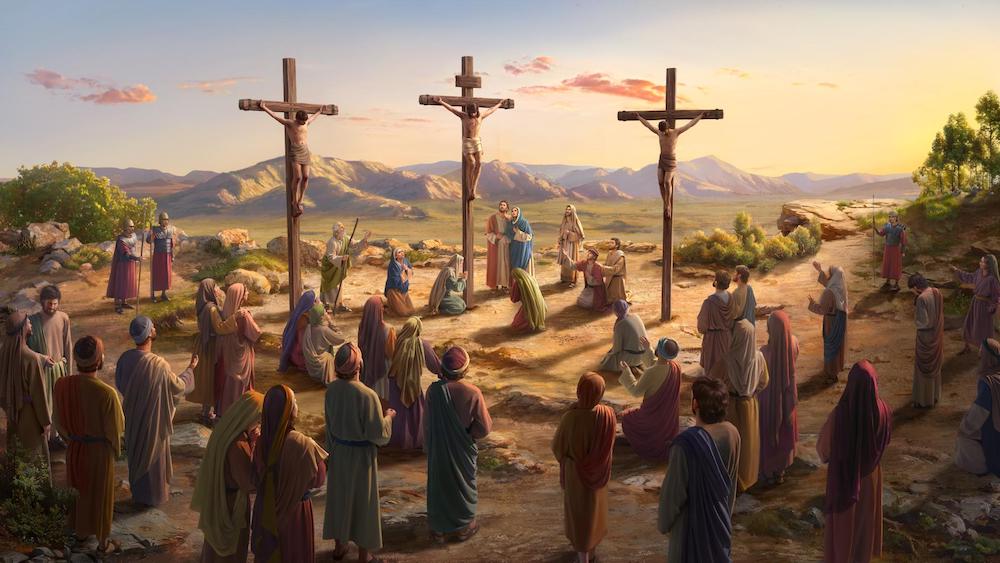What Does It Mean That Jesus Is the Lord of the Sabbath?
The Bible says, “At that time Jesus went on the sabbath day through the corn; and his disciples were an hungered, and began to pluck the ears of corn and to eat. But when the Pharisees saw it, they said to him, Behold, your disciples do that which is not lawful to do on the sabbath day. But he said to them, ‘But I say to you, That in this place is one greater than the temple. But if you had known what this means, I will have mercy, and not sacrifice, you would not have condemned the guiltless. For the Son of man is Lord even of the sabbath day’” (Mat 12:1-3, 6-8).
In my belief in the Lord in the past, I merely knew that when He came to do His work, the Lord Jesus didn’t keep the prohibitions of the Sabbath any more from the conversation in the verse between the Lord Jesus and the Pharisees, but I didn’t understand the deeper significance of these words and what people should know about God from this. Later on, only when I accepted the work of the Lord Jesus’ second coming did I know the true meaning of the word that the Lord Jesus said just then.
God says, “Let us first take a look at this passage: ‘At that time Jesus went on the sabbath day through the corn; and His disciples were an hungered, and began to pluck the ears of corn and to eat.’
“In this text, the first thing we know is that it was the Sabbath day, but the Lord Jesus went out and led His disciples through the corn fields. What is even more ‘treacherous’ is that they even ‘began to pluck the ears of corn and to eat.’ In the Age of Law, Jehovah God’s law stipulated that people could not casually go out or take part in activities on the Sabbath—there were many things that could not be done on the Sabbath. This action on the part of the Lord Jesus was puzzling for those who had lived under the law for a long time, and it even provoked criticism. As for their confusion and how they talked about what Jesus did, we will put that aside for now and first discuss why the Lord Jesus chose to do this on the Sabbath, of all days, and what He wanted to communicate to people who were living under the law through this action. This is the connection between this passage and God’s disposition that I want to talk about.

“When the Lord Jesus came, He used His practical actions to tell the people that God had departed the Age of Law and had begun new work, and that this new work did not require the observation of the Sabbath. God’s coming out from the confines of the Sabbath day was just a foretaste of His new work; the real and great work was still to come. When the Lord Jesus began His work, He had already left behind the ‘shackles’ of the Age of Law, and had broken through the regulations and principles of that age. In Him, there was no trace of anything related to the law; He had cast it off entirely and no longer observed it, and He no longer required mankind to observe it. So here you see the Lord Jesus went through the corn fields on the Sabbath, and that the Lord did not rest; He was outside working, and not resting. This action of His was a shock to people’s notions and it communicated to them that He no longer lived under the law, and that He had left the confines of the Sabbath and appeared before mankind and in their midst in a new image, with a new way of working. This action of His told people that He had brought with Him new work, work that began with emerging from being under the law, and departing from the Sabbath. When God carried out His new work, He no longer clung to the past, and He was no longer concerned about the regulations of the Age of Law. Neither was He affected by His work in the previous age, but instead worked on the Sabbath just as He did on every other day, and when His disciples were hungry on the Sabbath, they could pick ears of corn to eat. This was all very normal in God’s eyes. For God, it is permissible to have a new beginning for much of the new work He wants to do and the new words He wants to say. When He begins something new, He neither mentions His previous work nor continues to carry it out. Because God has His principles in His work, when He wants to begin new work, it is when He wants to bring mankind into a new stage of His work, and when His work will enter a higher phase. If people continue to act according to the old sayings or regulations or continue to hold fast to them, He will not remember or approve that. This is because He has already brought new work, and has entered a new phase of His work. When He initiates new work, He appears to mankind with a completely new image, from a completely new angle, and in a completely new way so that people can see different aspects of His disposition and what He has and is. This is one of His goals in His new work.”
After reading the word of Almighty God, I understood plainly the reason why the Lord Jesus didn’t keep the Sabbath day and the implied meaning of the word that “the Son of man is Lord even of the sabbath day.” From the fact that the Lord Jesus didn’t keep the Sabbath day, I saw that God’s work is always new and never old, and God doesn’t repeat the old work. At that time, that the Lord Jesus didn’t keep the Sabbath day represented that He had departed the Age of Law and had done new work, which was a furtherance on the foundation of the Age of Law. During the Age of Law, Jehovah God proclaimed laws and commandments in order to lead people and restrain them, letting them know how to worship God and that they themselves had sins. But in the later period of the Age of Law, the sins of man had grown more grievous so that they were not able to abide by the laws and commandments, only being punished for violating the laws. According to the needs of people, God ended the work of the Age of Law, and brought the new work of the Age of Grace—the work of redeeming mankind. Therefore, the Lord Jesus departed the temple and didn’t keep the Sabbath day any more, and people were not restrained and bound by the laws, the prohibitions and the rules. Meanwhile, the Lord Jesus also taught them that they should be tolerant and patient to others, love their enemies, forgive others seventy times seven times, etc. When people committed sins, as long as they came before the Lord Jesus to confess their sins and repent, their sins would be forgiven and then they wouldn’t be convicted and executed by the law. From this, we could see the work in the Age of Law had ended, and that the work done by the Lord Jesus was a furtherance based on the work of the Age of Law. Furthermore, when the Lord Jesus Himself came to do the work, He didn’t hold on to the old work, nor did He mention the precious work or continue it, instead, He only did the new work because the Lord Jesus is the incarnate God Himself and He Himself is the Lord of the Sabbath day. However, the Pharisees at that time defined God’s work by the old laws and the old rules, they condemned and resisted the new work of the Lord Jesus on the ground that the Lord Jesus didn’t hold on to the laws, nor did He keep the Sabbath day, and nor did He worship Jehovah God. It can be seen that in the hearts of the Pharisees, they considered the rules and rites were greater than God. They only believed in God but didn’t treat God as their Lord of the Sabbath day, and yet they regarded the rules and rites as their Lord. In this way, even if they kept the laws very well and piously, they wouldn’t receive God’s praise and commemoration, instead they would be condemned by God, because they didn’t keep up with the footsteps of the new work of God.
In the last days, Almighty God—the returned incarnate Lord Jesus has done a new stage of work on the foundation of the Age of Grace, and ushered in the Age of Kingdom, which is higher and deeper. Because in the Age of Grace, the Lord Jesus merely did the redemptive work, and He didn’t do the work of purifying and changing man. Our sins were forgiven due to the salvation of the Lord Jesus’ crucifixion, but it was that God didn’t remember our sins. Our sinful nature was still deeply rooted within, and our corrupt nature still belonged to that of Satan, therefore, we weren’t attained by God. According to the needs of the corrupt mankind, Almighty God has done a stage of work to judge man, purify man, change man and perfect man in the last days. However, in regard to the new work of God in the last days some people have made the same mistake as the Pharisees did. At that time when the Lord Jesus did His work, the Pharisees defined God in the temple and condemned Him, on the ground that man must keep the Sabbath day in the Age of Law. But today, some believers condemned the work of God in the last days, making the excuse that the work of God was beyond the Bible. What’s more, they condemned God by the work that the Lord Jesus did, thinking as long as the work was not the same as the work of the Lord Jesus, it couldn’t be accepted. In fact, Jehovah God, the Lord Jesus and Almighty God are the same Spirit, and they are also the same God. The work of God is done by God Himself. God is the One who begins an age and ends an age. When the Lord Jesus came, He didn’t keep the Sabbath day, because He is the Lord of the Sabbath day, and He brought the redemptive work. Those who kept up with the work of the Lord Jesus were those who just followed God. Similarly, the Lord Jesus has returned to flesh in the last days, brought the Age of Kingdom and done the work of judgment and chastisement so as to purify and perfect man. Only if we keep up with the work do we follow God. Just as Revelation 14:4 says, “These are they which follow the Lamb wherever he goes.”
We are creations, and God is the Creator. Only God knows the needs of corrupt mankind, we are only the objects of the salvation of God. So facing the new work of God, we shouldn’t define the new work of God by the work of the past, and even shouldn’t measure the new work of God by our conceptions and imaginations. What we should do is to seek, obey and accept. God’s word says, “Man should not define the work of God; moreover, man cannot define the work of God. In the eyes of God, man is as insignificant as an ant; so how can man fathom God’s work? Those who like to spout, ‘God does not work in this or that way,’ or ‘God is like this or that’—are they not speaking arrogantly? We should all know that man, who is of the flesh, has been corrupted by Satan. Mankind’s very nature is to oppose God. Mankind cannot be on par with God, much less can mankind hope to advise the work of God. As for how God guides man, this is the work of God Himself. It is fitting that man should submit, without professing this or that view, for man is but dust.”
We welcome you to use our Bible Verse of the Day to enrich your spiritual life.








